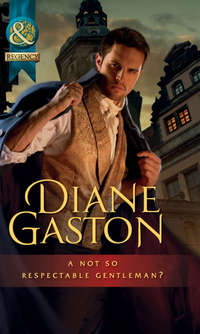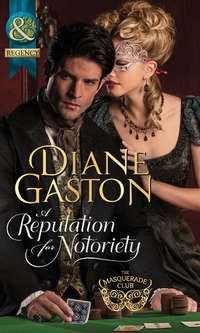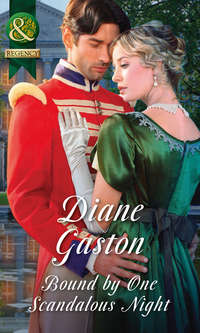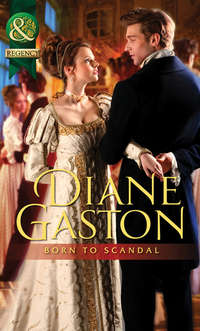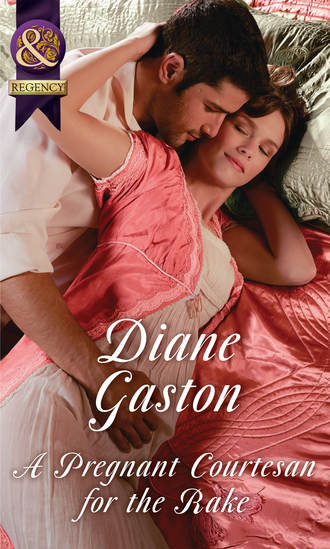
Полная версия
A Pregnant Courtesan For The Rake
Once in her gown and slippers, Ceclia said au revoir to the dresser. In the hallway with Vincent, there was nothing left to do but meet her customer.
Vincent held her by the shoulders and looked her in the eye. ‘Deep breath!’ he commanded. ‘Breathe in, Madame Coquette!’
She took a deep breath, closed her eyes and let herself become her alter ego.
Lifting her chin, she opened her eyes again and nodded to Vincent who turned her towards the door that led to the drawing room and gave her a little push.
With a slight sway to her hips that had not been there before, she entered the drawing room and made straight for Monsieur Legrand as if she were eager to be in his company.
He gaped at her as she approached him, almost spilling his glass of wine and only remembering to stand when she drew near.
‘Legrand,’ she said in a voice deeper than she usually spoke, emphasising the grand. ‘It is my pleasure to entertain you tonight.’
Legrand was a man in his fifties, who obviously enjoyed the fruits of his labour. His round stomach strained at the buttons of his waistcoat, which was well tailored and made of the finest cloth. His nose had the red hue of someone who enjoyed too much wine and his neck disappeared behind his jowls. Yet he displayed himself to her as if she would find him irresistible. No wonder so many courtesans had their beginnings in the theatre. It took a great deal of acting to convince a man such as this that his company was desired.
He’d paid a great deal for this night with her, although the manager of Maison D’Eros took the lion’s share. Her goal was to save enough for a modest living somewhere, ideally back in England, for which she was always homesick—even more so since spending the day with Oliver. It would take her a long time to amass such a sum. Years, perhaps. She’d been building Madame Coquette’s reputation over the last year and a half and she had little more than what travel expenses to England would cost her.
‘Shall we retire to my room?’ she asked, taking his arm.
‘Yes. Yes,’ he stammered.
She led him up to the second floor to a room that was not exclusively hers. Others, including Vincent, used it on other nights of the week.
She gestured for Legrand to open the door and she swept by him to enter the room, decorated in red-silk drapery on the walls and white and gold damask upholstering the chaise and sofa. The tables were mahogany embellished with gold and Egyptian motifs made popular by Napoleon’s invasion of Egypt. On the tables were crystal decanters of wine and brandy, bottles of champagne, and plates of grapes and cheeses. Prominent in the room was a large bed, its covers and canopy in a white fabric similar to the upholstered chaise and chair, trimmed in gold fringe.
Cecilia’s silk red gown was perfect for the room. She looked as if she were part of the room’s decoration.
Legrand closed the door and lunged for her, throwing himself at her and slamming his lips against hers.
She pushed him away. ‘Monsieur Legrand!’ She spoke with great indignation. ‘How dare you attack me like—like you are a hound in heat. I will not stand for such disrespect!’
‘Forgive me, madame.’ He grovelled. ‘I could not help myself. The mere sight of you lights a fire in me that can never be extinguished!’
She straightened her clothes. ‘Well, I suggest you compose yourself immediately. Remember the bargain, monsieur. You have paid for my time, but that is all. You must win me over if you want any more of me.’
This was the brilliant ruse Vincent had thought up for her. Her customers were required to make her want to bed them. And if she wanted it, she promised them rapturous satisfaction.
Of course, she never wanted any of them.
‘What might I do to please you?’ Legrand asked.
She lowered herself onto one of the sofas. ‘First you may pour me some champagne and amuse me with your repartee.’
‘Yes. Yes.’ Legrand nearly tripped over his own feet in his haste to reach the champagne bottle and open it.
The champagne always made being Madame Coquette a bit easier.
Legrand babbled of once meeting and advising Talleyrand, the French politician who’d managed to operate at the highest levels of government through Louis XVI, the Revolution, Napoleon and now the Restoration.
As if Talleyrand would accept advice from such a ridiculous man.
‘Talleyrand.’ She made a sound of derision. ‘He is the one no one trusts completely, is that not so? He is a traitor to France. Am I to admire you for associating with a traitor?’
If Legrand had vilified Tallyrand, she would have praised Tallyrand as a great statesman of France.
Because, no matter what Legrand said or did, she was not going to be pleased by him. He would never win her over. That was the point.
Legrand continued to try, attempting to impress her with his wealth and his success as a merchant. Cecilia could almost feel sorry for him, except he was willing to pay for a woman’s favours, merely to impress his compatriots.
Conversation inevitably came to an end and Legrand began spouting flattery. ‘Madame, your beautiful skin makes me long to touch you. You are the most ravishing of Paris courtesans. I would have paid double for this night with you. Triple. And considered it worth every franc.’
Cecilia wished her price had been negotiated higher. This was something to discuss with the manager, who might be underselling her services.
‘You flatter me, monsieur,’ she said, dipping her head and fluttering her lashes the way Vincent had shown her.
His expression turned eager. ‘Please, I beg you, madame. Sit with me.’
‘With pleasure.’ Cecilia girded herself and moved to the chaise.
Legrand put his arm around her. ‘This is much better. Much better.’
She pretended to sigh. ‘Would you pour me more champagne?’
‘More champagne?’ He sounded both surprised and disappointed. ‘As you wish.’
‘For you as well.’ She smiled sweetly.
He opened the second bottle of champagne and poured two glasses, handing one to her.
She tapped her glass against his. ‘To this lovely night.’
He puffed up with hope. ‘This lovely night.’
He drank the contents in one gulp and put his arm around her again. As Cecilia slowly sipped hers, he stroked her arm, then became bolder and put his hand on her thigh.
‘May I kiss you?’ he asked while he performed the greater indignity of kneading her thigh.
She took her time to drink the last of her champagne, then smiled. ‘Of course you can!’
He placed his dry, thin, fleshless lips against hers and held her in both arms.
She made herself remain still for a moment, before starting to cough. And cough. And cough.
He released her. ‘What can I do? More champagne?’
She nodded, still coughing.
His hand shook while he poured another glass of champagne. She grabbed it from his hand and drank as if desperate for it.
When she’d composed herself again, she apologised. ‘Forgive me, monsieur. I—I tried...’ She let her voice trail off.
She positioned herself for another kiss and Legrand eagerly complied. This time he opened his mouth.
She made a sound and again pushed him away. ‘Did you clean your teeth, monsieur?’
‘My—my teeth?’ He looked befuddled.
‘I am sorry, but your mouth—the taste, the smell—it makes me cough.’ She reached for her champagne again.
He cupped his hand near his mouth and exhaled, trying to smell his own breath.
‘I cannot kiss you, monsieur.’ She frowned. ‘I am so sorry.’
He moved towards her. ‘We can proceed without kissing.’
She allowed him to touch her, to fondle her breasts, to run his hands down her body before pushing away again. ‘It is no use, monsieur. I am certain you are a very fine gentleman and I am so very impressed by your wealth and your importance, but I must feel something for the men I bed. They must stir me and you—you do not.’
He looked as if she’d slapped him.
This was the dangerous moment. When the man was filled with lust, but spurned. This was when Hercule might be needed.
‘I am very certain this has never happened to you before,’ she said. ‘You are such a fine gentleman. I do not know what is wrong with me.’
He puffed up again. ‘Never happened before. Never. Women like me. Many women.’
‘I am certain they do,’ she said soothingly.
He gave her a hopeful look. ‘Perhaps we can proceed anyway? I will not hold it against you if you do not—do not get pleasure from it.’
‘Monsieur Legrand!’ She pretended to be horrified. ‘You wish me to bed you without feeling on my part?’
‘Well...’
She shook her head. ‘No. That is not what I do. Remember the bargain?’ The rules set forth for a night with Madame Coquette were very specific. ‘I must want to couple with you and now, I simply cannot. I will have another coughing fit and I know you would not wish me to have another coughing fit.’
‘No...’ He rubbed his face. ‘I told all my friends.’
‘You told your friends that you had arranged a night with me?’ she asked.
He nodded, looking horror-struck.
She reached over and patted his hand. ‘It is not your fault. It is entirely mine.’ She always tried to take the blame. She had no wish to humiliate the men, although with some of the more unpleasant ones, it was tempting.
‘No one will believe that.’ His lower lip jutted out like a hurt child. ‘Some of them are here tonight. In the card room. If they see me leave early—’
‘You must not leave early, then!’ she reassured him. ‘We will stay the whole night, until just before dawn. Will that do?’
He seemed to be considering it. ‘Just before dawn. That might work. My wife will expect me home about then.’
The men always had a poor wife waiting at home.
‘And you must tell your friends whatever will impress them,’ she added. ‘I will never say anything but that my time with you was incredibly passionate. I will say I was impressed by your skill—because I am sure I would be, if it were not for my awful cough. Because of the smell.’
‘You would be, that is very true.’
She patted his hand again. ‘I am very sure I would be.’
He flushed with pride, as if he really had given her incredible passion.
Cecilia was always surprised how easy it was to talk these gentlemen out of bedding her by complimenting their supposed prowess. What the man’s friends thought of his night with her was always more important to them than the act itself.
‘What will we do all night?’ he asked.
She opened a drawer and pulled out a deck of cards. ‘We can play piquet!’
Chapter Five
November 1818, three months later
Oliver leaned against the wall in the billiard room of Vitium et Virtus, watching Frederick and Jacob knock the balls in the pockets of the green baize table. The day’s weather was cold and drizzling, but the fire in the fireplace kept the room comfortably warm. Frederick was meticulously lining up his next shot, taking long enough that Oliver began tapping his foot.
‘Just take the shot, Fred,’ he said impatiently. ‘This fuss does you no good.’
Frederick ignored him and continued to study the ball some more before placing his cue and executing a perfect shot, sending Jacob’s cue ball and the red ball into the pockets.
‘That’s the game,’ groaned Jacob.
Frederick looked up and grinned. ‘Does me no good, Oliver?’
‘You would have made it without all that fuss.’ Oliver picked up his cue and stepped up to the table while Frederick retrieved the balls from the pockets.
Jacob flopped in a chair. ‘That is the second game you’ve won over me.’
‘You were distracted.’ Frederick turned his grin on the new duke. ‘Thinking of your bride, no doubt.’
Jacob laughed.
It was gratifying to see Jacob happy. Oliver had often caught Jacob spending the night hours at Vitium et Virtus, drinking and looking more haggard by the day.
Jacob had been reeling with grief over the accident that killed his father and brother, and lamenting that he was not up to the enormous responsibility of a dukedom.
But then Jacob met his Rose.
Oliver wished them well. He really did.
He wished Frederick and Georgiana well, too.
Both Oliver’s friends were obviously besotted with their wives. When Oliver saw them with the women, the loving looks and tender touches between them reminded him of the many gestures of affection he’d long ago witnessed between his mother and father.
But his father had still left his mother behind in India.
Obviously love fled in the wake of expediency. Once gone, love could destroy.
Oliver sincerely hoped the love shared by Frederick, Jacob and their wives would not be so easily shattered. But he would not wager any money on it.
And he was known to wager on almost anything.
Oliver stood next to Frederick and they hit their respective cue balls simultaneously to see who would have the first shot. Oliver’s ball stopped closest to the baulk cushion. He went first, hitting both Frederick’s cue ball and the red ball.
Oliver concentrated on the billiards. That was what he liked about games or any competition. He could focus on winning and push all other thoughts out of his mind. Unfortunately, Frederick’s careful approach to billiards gave Oliver too much time to think.
He frowned and crossed his arms over his chest.
‘Back to discussing my wife,’ Jacob said in good humour. ‘I highly recommend marriage.’
‘As do I.’ Frederick continued to eye the ball. ‘You should try it, Oliver.’
‘Not likely.’ Oliver’s reply came quickly.
‘You will change your tune.’ Frederick continued to consider the placement of his cue. ‘Once you meet the right lady.’ He finally hit the red ball and sent it into a pocket.
Did Frederick not see how easily his marriage to Georgiana might have turned to misery? Oliver held his tongue, though.
He took his shot and this time sent Fred’s cue ball into a pocket.
‘Maybe he already has.’ Jacob rose to pour himself some brandy. He turned to Oliver. ‘The mysterious Parisian lady.’
Cecilia.
‘Nonsense.’ He regretted telling them of her, not that he’d said much, and it had taken him some time to divulge even that meagre information. He never discussed the more private elements of his time with women.
‘You cannot tell us you do not think of her,’ Jacob persisted. ‘You’ve been different since that trip. A veritable malcontent.’
‘I dispute that statement.’ Oliver tapped his foot, impatient over Frederick’s care in executing his shot. Or at least that was the reason he told himself his toe was tapping.
Frederick finally hit the ball. ‘I agree with Jake. You’ve been moodier. And what lady was your last conquest? No one since Paris.’
Frederick was right, of course. ‘You assume too much. Perhaps I do not tell you of my every liaison. Perhaps I am discreet.’ Oliver took his shot and missed.
His friends exchanged knowing glances.
He played the rest of the game in disgruntled silence. And lost.
Oliver refused to believe that the brief encounter with Cecilia had sent him into this funk. Perhaps the cause was because he’d not accomplished his goal in Paris. He’d not found very much new to offer at their club. Nothing, at least, that was not distasteful to him.
Too much of Vitium et Virtus was becoming distasteful to him.
But that was a worry that had preceded his trip to Paris.
He must admit that the memory of Cecilia did linger in the recesses of his mind. A church bell would call back the image of her in Notre Dame, the sun through the rose windows bathing her face in colour. One of the lady patrons of the club wrapped her Kashmir shawl around her shoulders, just as Cecilia had. Their new French songstress had Cecilia’s colour hair.
Reminders were to be expected, were they not? Yet surely that bore no special significance.
‘Another game?’ Frederick held up a cue ball.
Jacob stood and picked up a cue.
Oliver poured himself some brandy and lowered himself into a chair. The room had been designed for their comfort, his, Jacob, Frederick and Nicholas. The richly carved oak panelling on the walls came from a German monastery. The billiard table, with its fine green-baize surface, filled the room’s centre, but around it were the most comfortable chairs in the club and enough tables and cabinets to hold the ever-present brandy. The chandelier’s many candles illuminated the billiard table so play could continue all night, if desired.
Very occasionally they offered billiard tournaments, the prize of which was some debauched spree, but most of the time this room was for their own amusement. Oliver preferred it that way. Increasingly he was preferring the days Vitium et Virtus was closed and he had time to himself.
He, Frederick, Jacob and Nicholas began the club back in their Oxford days. It was secret, exclusive and naughtier than the Hell Fire clubs of their grandfathers. Vitium et Virtus also lacked the Hell Fire clubs’ anti-religious affectations. No black mass for Vitium et Virtus. No devil worship or paganism or ridiculous rituals. Their club worshipped pleasure and excess, in card-playing, drink and fornication. It had been their highest accomplishment at the University.
When they left Oxford, they brought the club to London.
What did Oliver care that he was not welcome at Almack’s? He belonged to Vitium et Virtus.
Life had been good right up until that night six years ago when Nicholas disappeared, leaving only a pool of blood and his signet ring in the alley behind the club.
Oliver, Frederick and Jacob had kept Vitium et Virtus running for Nicholas’s sake, but for how much longer? Frederick and Jacob were now married. What honourable gentleman runs a club of Dionysian revels when his wife is waiting at home?
Oliver would keep it going by himself, if necessary. To him, giving up on Vitium et Virtus was like giving up on Nicholas. He refused to believe Nicholas was dead.
He finished his brandy and poured another.
Enough blue devils.
‘I do have one new idea for the club,’ he began.
Jacob grinned. ‘Nothing that involves driving hooks through one’s skin and hanging from ropes.’
Oliver had told them of the self-mutilation and flagellation of some Paris clubs.
‘Not unless you wish to try it,’ he shot back.
Jacob held up both hands. ‘Not me!’
‘We could have a Vitium et Virtus ball.’
‘Oh, that is original,’ Frederick said.
‘Not the usual sort of ball.’ Oliver rose and picked up one of the billiard balls from a pocket. ‘We have two baskets of balls like these, only each ball has a number painted on it. There are matching numbers for men and for women. The men pick from the men’s basket and the women from the women’s. Then they partner up with the person whose number matches theirs. No one knows ahead of time who their partner will be.’
Frederick straightened his spine. ‘Georgiana and I will not play.’
Jacob laughed. ‘Nor will Rose and I.’
Oliver shook his head. ‘Of course not.’ In truth, he also had no desire to play that game. ‘I think several of our members will relish it, though. We know many married couples who would clamour to be first in line to play.’
Frederick turned back to his game. ‘You manage it, if you like, but you had better make certain everyone knows what to expect.’
‘What if Bowles shows up?’ Jacob asked.
Frederick missed his shot.
Nash Bowles was a nasty fellow they’d known since their Oxford days, who’d joined before they’d become more selective. He’d lately pressed to purchase Jacob’s share of the club.
Frederick’s lips thinned. ‘That reprobate.’
Bowles was the reason Fred had married his Georgiana. Vitium et Virtus had held a virgin auction which was supposed to have been a total farce. The women usually auctioning their wares were certainly no virgins, but instead, those who loved the sexual excess of the club. Instead, respectable, well-bred Georgiana Knight, a viscount’s daughter, had climbed up on the table and offered herself. Frederick had bid on her, intending to protect her reputation.
‘Bowles.’ Fred spat out the name like a piece of rancid meat. ‘He had better behave himself or he will answer to me.’
Bowles had threatened to ruin Georgiana for her escapade at Vitium et Virtus unless she married him as her father wished.
Honourable Frederick married Georgiana instead, to rescue her from Bowles. And somehow Fred and Georgiana had fallen in love with each other.
What were the chances that marriage would remain blissful? Especially since Georgiana was so free-spirited.
And how long would Jacob remain besotted with Rose? He was a duke and she had been a maid here at Vitium et Virtus. How long before Jacob left Rose like Oliver’s father had left his mother?
‘You two should go home to your wives,’ Oliver said. His friends had better do right by those good women or they’d have to answer to him.
‘I was thinking the same thing,’ Fred said.
Jacob looked pensive. ‘I was thinking how lucky I am to have this happiness. And how much I wish Nicholas could share in it.’
‘Nick.’ Oliver’s voice rasped with pain.
He placed his hand palm up on the billiard table. Jacob and Frederick placed theirs on his. ‘In Vitium et Virtus,’ they recited together.
They’d been schoolboys when they first contrived this oath, resurrecting it after the night Nick vanished to remind them that they were still four. Nicholas was somewhere, Oliver insisted. And somehow he’d find his way back to them.
They broke apart, and Frederick poured more brandy. He lifted his glass in a toast. ‘To absent friends.’
Oliver and Jacob raised their glasses.
‘Be he in heaven or hell—’ Oliver continued, a refrain they’d repeated several times in the six years Nicholas had been gone.
‘Or somewhere in between—’ Fred added.
‘Know that we wish you well.’ Jake ended it.
If only words could magically bring Nick back.
They downed their brandy in silence.
* * *
After Oliver said goodbye to his friends, he made his way to the back door, the private entrance used only by him and his friends. The drizzle persisted, so he dashed across the garden and out the gate, through the alley and the garden of the town house on Bury Street adjacent to the club. Oliver’s town house. How lucky he’d been to be wealthy enough to buy a town house so conveniently located to Vitium et Virtus.
When his father became the Marquess of Amberford and inherited the property and riches to go with the title, he’d settled the fortune he’d acquired in India on Oliver, a fortune great enough that Oliver could live more than comfortably. He could afford many pleasures. Fast carriages, matched horses, beautiful women.
Funny that Oliver used to fear he’d be poor. When he was a boy, his father’s wife often threatened to put Oliver out on the streets. Eventually he learned about his fortune and that she could not touch it. When his father was not present, she was always nasty to Oliver. He’d absolutely believed he could be tossed out onto the streets like Cecilia’s street urchins—
Cecilia.
Again she popped into his mind unbidden. For the last three months the memory of her caught him at odd moments. Why should she inhabit his thoughts so often? He’d only known her one day.
Perhaps the brevity of their time together had enhanced the experience, made it grander, magical. It had seemed as if she’d appeared out of the mist and disappeared as quickly. No liaison of his had ever begun so unexpectedly and ended so abruptly.
He reached the garden door of his town house and went inside, brushing the raindrops off his coat and hair. He greeted his cook and housekeeper as he passed the kitchen and made his way up to the hall where his butler stopped him.



